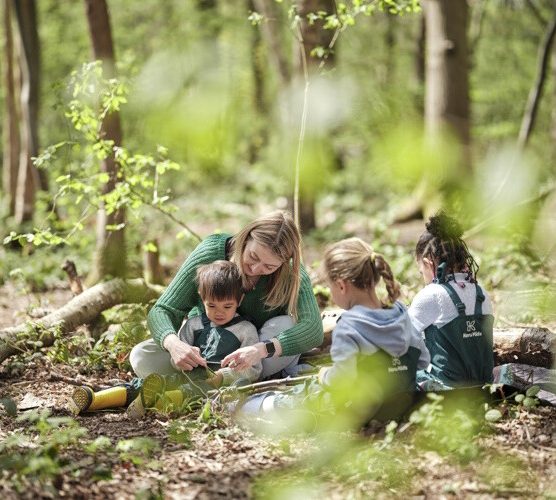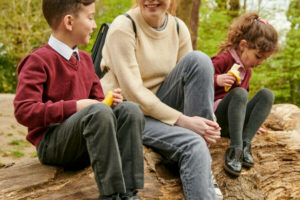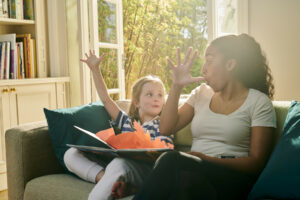Here’s a breakdown of your child’s skills, divided into different stages, with a handy guide on how you can best support their development.
There are numerous areas in which children can grow and learn physical, cognitive, social and emotional skills. However, it is important to note that each child is unique and will develop at their own rate, so all information given in this article should be given as an approximate guide – as always, you know your child best.
Jump to read more about skills development stages at:
Infancy (0 to 2 years)
Early childhood (2 to 6 years)
Middle childhood (6 to 12 years)
Adolescence (12 to 18 years)

Photo by Jonathan Borba on Unsplash
What type of skills development are there?
Physical Skills: this is a child’s ability to use their body effectively and efficiently. This can include gross motor skills (i.e. running, jumping, and throwing) and fine motor skills (i.e. writing, drawing, and using scissors). Physical skills development is important for children’s overall health, well-being and confidence.
Cognitive Skills: this is a child’s ability to think, reason, and learn. This can include problem-solving, decision-making, and critical thinking. Cognitive skills development is important for children’s academic success and ability to navigate and understand the world around them.
Social Skills: this is a child’s ability to interact and communicate effectively with others. This can include skills such as listening, empathy, and cooperation. Social skills development is important for children’s relationships with their peers and family members, contributing to their sense of belonging and self-esteem.
Emotional Skills: this is a child’s ability to understand and manage their emotions and recognise and respond appropriately to the emotions of others. Emotional skills development is important for children’s overall mental health and well-being.
Skills Developments at Different Ages
Infancy (0-2 years)
Physical skills: This includes learning to use their hands and fingers to manipulate objects, crawling and walking. ‘Baby mouthing’ is a normal part of development when children begin teething and putting things in their mouth, and it helps children with skills to do with jaw development.
Cognitive skills: These skills develop rapidly during this early stage – in the first few years of life, babies learn to focus their vision, reach, explore and learn about the world around them. Their language begins to develop, and they begin to imitate caregivers by babbling and starting with their first words
Social skills: You may notice your little one copying your facial expressions or waiting for a cue on how to respond.
Emotional skills: By approximately nine months, they would have learnt some emotions, which will then begin expressing from 10 months onwards. They will begin to recognise themselves in the mirror, and stranger anxiety will begin at around nine to eighteen months.

Photo by OPPO Find X5 Pro on Unsplash
Early Childhood (2-6 years)
Physical skills: By about four years old, children should be using utensils, go to the bathroom by themselves and be willing to play in a playground, climbing and swinging.
Cognitive skills: Children will begin learning foundational academic skills such as counting and recognizing letters and numbers. You can support your child by getting them involved in games with counting, like hide and seek or counting how many cars you see passing on walks to school. From four years onwards, they should begin speaking more coherently and confidently and having conversations where they can tell stories and tell you what they want or events that happened at school.
Social skills: This is a crucial time for children to learn and practice important social skills such as sharing, taking turns, and listening – this usually develops fastest among siblings or in school environments.
Emotional skills: Children will begin to copy behaviour like affection towards friends and family, showing concern towards crying friends and will understand the ideas of mine/his/hers. The older they get, the more they’ll enjoy trying new things.

Photo by Robo Wunderkind on Unsplash
Middle Childhood (6-12 years)
Physical skills: By about eight, children should be able to dress and look after themselves completely, with an idea of appropriate behaviour relating to getting undressed etc.
Cognitive skills: From ten onwards, children will begin to develop quite a lot of their own interests and experiment with new hobbies, some of which may be emulated from yours/older siblings/friends at school. They will also begin developing quite a lot academically, taking part in independent reading for pleasure. They should keep up with homework, follow along with the general curriculum to know how to tell the time, months and days of the week.
Social skills: This is a lot more of a social development stage, where children will begin valuing friendships and becoming involved in activities that they begin to enjoy, like sports or art.
Emotional skills: They will begin to enjoy talking to people their own age, and may have a best friend. They should be able to express their emotions. At this age, they should be able to cooperate with others and understand how to behave appropriately with different age groups (i.e. gently towards babies).
Adolescence (12-18 years)
Physical skills: Your child will begin to shoot up, growing taller quite quickly and changing physically. A caregiver should be supportive in this stage, ensuring that their child has positive body image ideas and empowering them.
Cognitive skills: This is a stage of intense academic development and pressure, with a lot of school work needed, so children will need support. Similarly, in their late teens, adolescents will feel the desire to become more independent, and support should be given to provide them with more responsibilities and the chance to destress too.
Social skills: Friendships will be further developed, their interests and interpersonal skills honed, and friends will become important to your teen.
Emotional skills: Their attachment may shift from a family-dependent perspective to take a more independent focus and active role in their peers’ lives. At this stage, there’s the potential for a lot of stress with friends and academics, so it is important to be supportive.

Photo by Daiga Ellaby on Unsplash
How you can help with your child’s skill development
Physical development:
It is important to support them depending on what stage they are in.
If they are learning to walk, encourage them with positive talk and support if they are scared.
Providing them with the right support, be it rollable walkers or just spending time with them and encouraging them. As they age, encourage independence and make sure they know they can come to you if they need support.
Cognitive skills:
- Challenge your child appropriately, talking to them and spending time reading to them is especially useful and is an enjoyable activity for both.
- Playing make-believe as they age into toddler/early childhood stages.
- Take them on days out, spending time with them in nature.
- Make sure they have time to solve problems independently.
- As they’re older, in their teens and their workload begins ramping up, providing them with a comfortable environment to learn and support if they need it.
Social skills:
- Encourage them to spend time with their peers and friends.
- When they’re younger, encourage positive behaviours like sharing or playing games nicely and explain why anti-social behaviour isn’t so nice.
- Host playdates, go for days out and spend time with them when they’re younger to develop their sense of self.
- As they age, be the listening ear for any friendship drama and ensure they always have someone to talk to.
Emotional skills:
- Provide them with a supportive, nurturing environment to develop emotionally through strong affirmations and affection.
- Teaching them how to treat siblings, friends and peers is important for later development and overall interactions as they age.
- Children typically follow by example, so make sure to keep your emotional interactions in check.
- Be there for your older kids, and make sure they are doing okay when dealing with a ton of changes.
From physical skills to cognitive, social, and emotional skills, there are numerous areas and ways that children can grow and learn. However, it is important to remember that each child is unique and will develop at their own rate, even with the same training and support.
By providing a nurturing environment and offering a variety of age-appropriate activities and experiences, caregivers can help children to develop and practice important skills throughout their childhood.
Don’t stress – your child will develop exactly at the pace that is right for them. If you’re ever concerned, talk to a medical professional and get any support you need.



